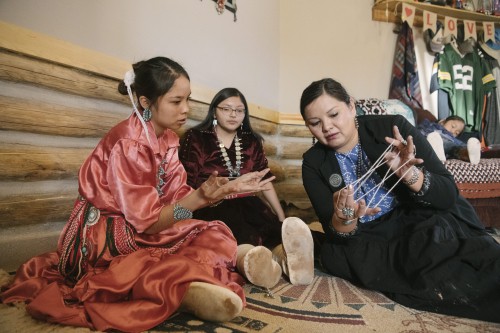About
The Female Pathways (Asdzáán Be’eena’ in Navajo) program was designed through a collaboration between Johns Hopkins Center for Indigenous Health and Navajo Nation community members and cultural experts. With the goal to promote protective factors that are associated with preventing risky sexual behaviors and substance use among adolescents, the program engages girls ages 10-14 and their mother or other female caregiver in 11 sessions. Sessions are taught either with the youth and caregiver as a pair or in small groups of youth and caregivers together, and delivered by local family health coaches trained and hired by the Center for Indigenous Health.
EVIDENCE TO DATE
A 2018-2020 pilot study conducted in the Tuba City and Chinle communities showed that Asdzáán Be’eena’ improves parent-child relationship quality and communication. The program also increased girls cultural knowledge and connection, self-efficacy, social support, and sexual health knowledge while also decreasing depression, anxiety and attention problems. In caregivers, Asdzáán Be’eena’ was shown to improve social support and parenting self-efficacy.
FURTHER EVALUATION
With funding from the federal Administration for Children and Families, the Asdzáán Be’eena’ program is currently being evaluated in two Navajo communities through a rigorous 3-year trial to assess its effectiveness.
Study participants include Native girls ages 10-14 and their adult female caregiver (referred to as dyads). We will enroll 320 child-caregiver dyads over the 3-year period. Half of the dyads will receive the program and half will receive a control condition. All participants will complete parental permission/assent and informed consent as well as a baseline assessment prior to participating in either program. We will assess program impact through post-program evaluations immediately following program completion as well as 6 and 12 months after program completion. All evaluations will be administered by trained independent evaluators.
We aim to complete the program implementation by Fall 2023. If proven efficacious, the goal is for this program to be scaled to other tribal communities promoting intergenerational wellness and focusing on the power of culture and family in Native communities. A similar program (Telling Our Daughters Our Stories) was also developed in the White Mountain Apache Community.
This is work is funded by a grant from the Administration for Children and Families (ACF).
FOR MORE INFORMATION CONTACT:
Chinle Coordinator: Marissa Begay: mbegay5@jhu.edu
Tuba City Coordinator: Tracey Lee: tlee176@jhu.edu

